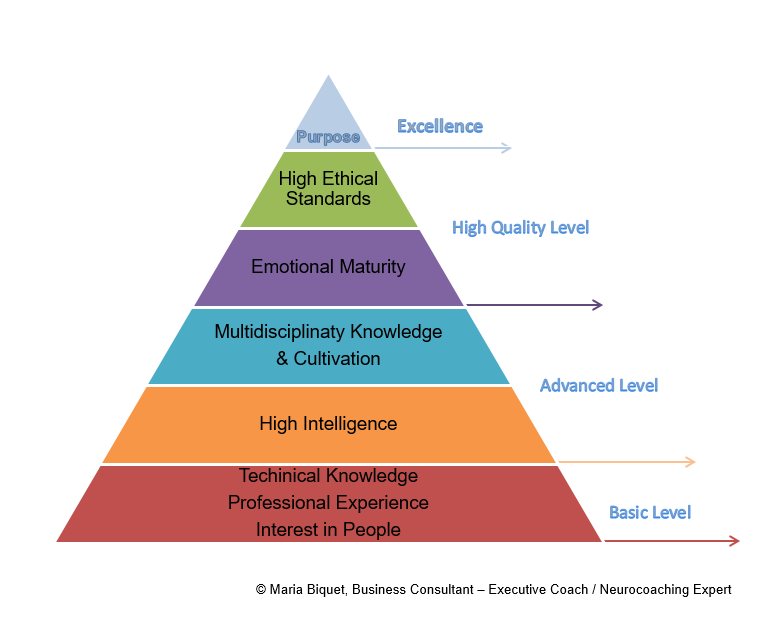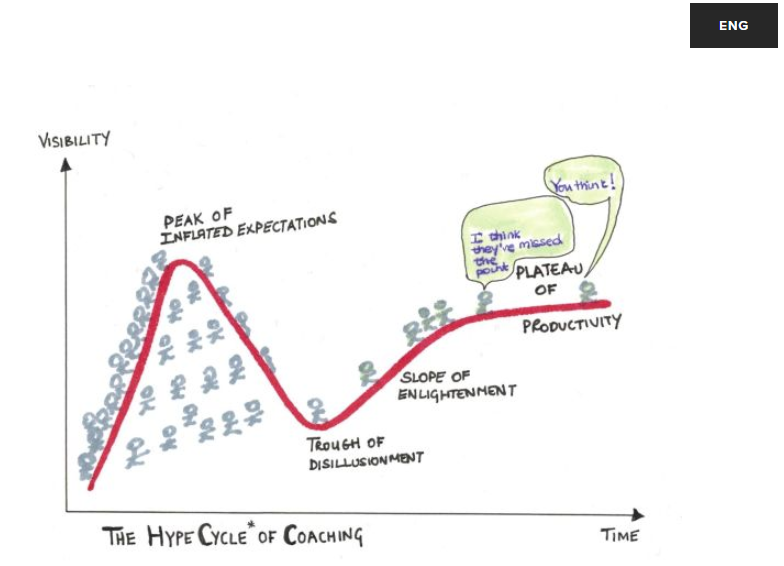High Quality in the Coaching process by Maria Biquet
Practicing Coaching for years and reaching a point of maturity I have come to some observations and conclusions about what we really do when we work with people in a coaching process.
Quality is the key issue for such an “easy to entry” job and this is what I believe differentiates excellent professional coaches to good and average coaches.
The 8 Essential components of High Quality Coaching
From my experience in working initially as an Executive and later as a Coach with Banks, multinational companies and non-profit organisations, I have concluded that there are 8 essential components of High Quality that can be split across four quality levels:
Interest in people (Pre-requisite)
Technical Process Knowledge (Basic level)
Professional Experience (Basic level)
High Intelligence (IQ) (Advanced Level)
Multidisciplinary knowledge and cultivation (Advanced Level)
Emotional maturity (High Quality Level)
High ethical standards (High Quality Level)
Higher purpose linked to others and society (Excellence)
Basic Level
This is the entry level of what we use to quickly assess via simple observations of what’s expected of a Coach.
The essential prerequisite for a Coach is Interest in people.
How else can we do a job that focusses on people and their needs? How can we imagine and ask the right questions that will lead to a breakthrough in the Client’s thinking? And how will we be able to support them through the hard process of change if we are not truly interested in them and engaged in the process of developing them while protecting them from triggering their trauma?
Technical Knowledge and Professional Experience
They are the basis of anything we do. We need a process that is designed to lead to a result. And we must try in practice what we have learnt; follow the specific steps to build gradually the way to the desired goal. This is the role of Coaching models that set a standard process for a new Coach who tries them, understands them and gains the knowledge of what works and what doesn’t.
Advanced Level
At this next level, it goes BEYOND the application of a Coach simply applying a process TO being empathetic with high intelligence with each of their clients AND working across multiple contexts and cultural levels from expanding our intelligence.
High Intelligence (IQ)
High quality Coaching requires a Coach that can understand the client’s mental models and thinking process in order to be able to bring transformation. A highly intelligent person has the ability to analyse and map the thinking process not just understand the thoughts. If a person presents their thoughts and beliefs, us Coaches need to have a developed intelligence in order to be able to think in a wider and deeper way and figure out how the person perceives the facts and events and interprets them in their own reality. In this way we can help them reconstruct their own thinking towards their objectives and goals.
Intelligence goes together with multidisciplinary knowledge and cultivation.
In fact continuous learning and study of various subjects in science, business and art enhance our cognitive abilities and expand our intelligence. A cultivated person that dedicates time to read, think and incorporate the new knowledge into their practice improves their intelligence. For a Coach it is not enough to know the coaching models and methodologies; we need to have knowledge of anthropology, politics, history, biology, sociology, psychology, business, management and all sciences related to human behaviour in order to be able to understand our clients’ reactions in different conditions and situations.
If we want to help others in their own journey to self- discovery, we must get rid of our ego and our egotistical needs for acknowledgement, power, acceptance and vanity.
High Quality Level
To be consistently operating at this level of high quality suggests that a Coach has reached a level of maturity that is able to absorb, manage, normalize and let go of tensions that typically arises in each and every moment of a complex coaching conversation caused by externalities and internal conflicts. This means a Coach needs to both emotionally mature and constantly maintain high ethical standards; role modelling the characteristics of what it means to be of high quality.
Emotional maturity is probably one of the most difficult personal achievements in the process of our own development.
If we reach the point that we understand ourselves, our fears, our inner motives, our behavior, our relationships, our position in our environment, the way we relate to others and consciously manage to regulate our behavior and take responsibility for our actions, then we can start talking about emotional maturity. This is a highly complex and difficult process that never ends; it is our continuous effort to “know ourselves”. If we want to help others in their own journey to self- discovery, we must get rid of our ego and our egotistical needs for acknowledgement, power, acceptance and vanity.
We must step down of the stage and let the client be who they are; facilitate them become their own best and not what we think is best for them. Our own limiting beliefs and emotional needs like need for love, lack of self-esteem, jealousy, negativism, lack of realism and the list goes on and on, must be out of the way and this is possible only if we are mature enough to see it.
Together with Emotional Maturity we must list High Ethical Standards.
In a way they go together because emotional maturity is a prerequisite for a person in order to have high ethical standards. High ethical standards are not the theory but the real practice of what we truly believe and the manifestation of our value system in the work we do and the life we lead.
Respect of any kind of differences in culture, background, mentality, needs, privacy is the basis. Working with the client for their own objectives and for their own development is essential. On the other hand, we should respect our own work and set limits in our own personal engagement treating them as professionals and not as friends.
Would you coach an unethical executive who destroys people’s lives and careers to further improve their “performance”? Ethical dilemmas are the most difficult to answer in our job…
It is also very tricky when the client asks for support in achieving something that is professionally or socially unethical; we must decide about our own ethics in that case. Would you coach a criminal? Probably not. Why then support an executive who is doing harm to other people’s lives with his/her actions? Ethical dilemmas are the most difficult to answer in our job… But even in the simpler cases, like for example, trying to extend a contract for longer than needed or accusing the previous coach that they didn’t do a good job, do not consist a professional approach and we can see them both happening very often.
Excellence – Higher Purpose
Higher Purpose is the unique attitude and goal that distinguishes the very few who become a paradigm in this job and their lives!
What makes a Coach reach the level of Excellence? Why do we do this job?
Is your own purpose in life manifested through your work?
Is it linked to a Higher purpose for the good of others and the society?
Although it sounds too ambitious and romantic for our technological and scientific era, this is the privilege of the very few people who really want to make a difference in this world.
Where next?
In this article I have provided some insights from my experience of what I think is required from high quality coaching. As the beginnings of a working framework it has helped me to share and map out what I believe is a more useful way to differentiate between Excellent and Good coaches. Each of the components deserves its own explorations, and I hope to do that in future pieces.
Meanwhile, the following are some key questions that I have tried to answer in this article and would be happy to receive your thoughts:
How do we define Quality in a complex process like this?
How can we claim that we offer high quality Coaching during the whole process from the first meeting to the last session?
Does Accreditation or Certification guarantee that the Coaching you deliver is high quality compared to a non – accredited Coach?
And, most importantly, what is High Quality Coaching compared to standard Coaching delivered by most Certified or Accredited Coaches?
To connect with Maria Biquet
Maria Biquet is an experienced multilingual Business Consultant and Executive Coach with vast experience from diverse business fields. Maria has long experience in Strategic Marketing and in establishing companies in new markets.
For more than 20 years she has studied various methodologies for self development and change including Neuroscience in Coaching, Systemic approach, Appreciative Inquiry Approach, NLP and mindfulness techniques. She holds a University degree in Language & Linguistics and an MBA-International Marketing.
Vice President of Marketing & Communications of HCA (Hellenic Coaching Association) EMCC Greece, member of the EMCC (European Mentoring & Coaching Council). Works as a volunteer with Non Profit Organisations; is a Mentor at Orange Grove for startup companies and at Cherie Blair Foundation. Project Leader in research projects on ethics in collaboration with EMCC .
Works in Greek, English and French.
Email: mariabiquet@gmail.com, Tel.: +30 6944 889526 | www.quantaconsulting.co.za













